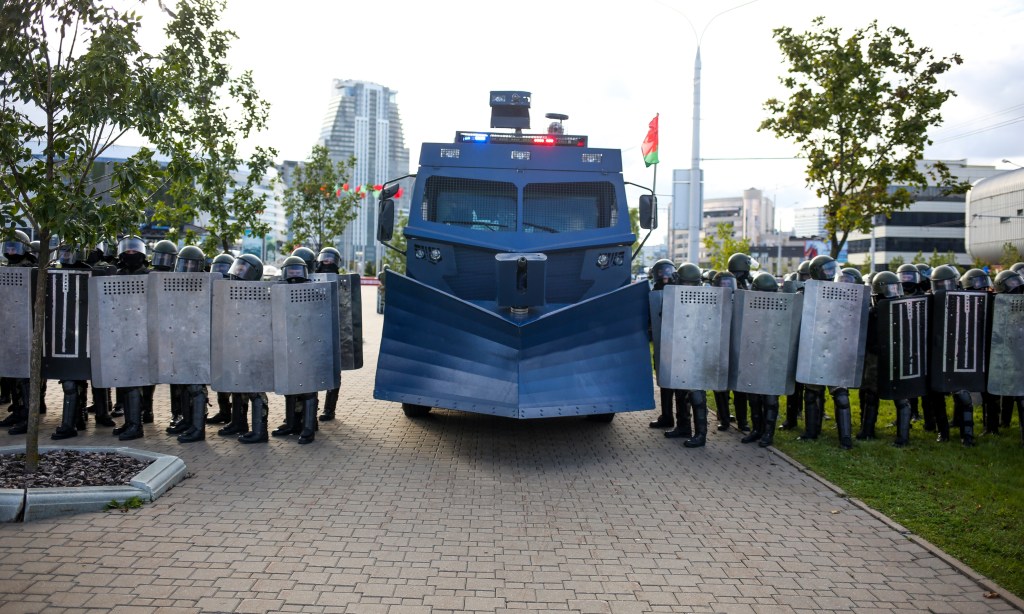Vilnius, Lithuania, September 14, 2020 – Authorities threatened last week to censor another major domestic news website in Belarus, where dozens remain blocked amid nationwide protests, local journalists told CPJ.
On September 9, the Ministry of Information warned Tut.by, one of the most popular independent news websites in the country, that its reporting on a protester’s detention put it at risk of blocking — the third such warning in the space of a month, its chief editor Maryna Zolatava told CPJ by phone.
Tens of thousands of protesters gathered in the capital, Minsk, on September 13 to sustain calls on President Aleksandr Lukashenko to step down in the wake of a disputed election, according to The Associated Press. Mobile internet services were disrupted in Minsk the same day, which two local internet service providers ascribed to action by state agencies, according to the Belarusian Association of Journalists.
Bloomberg reported on August 28 that Sandvine Inc., an American company, provided a national agency in Belarus with the technology to censor the internet via an intermediary company in Russia. U.S. senators have since called for a probe into the company, according to Bloomberg. Sandvine emailed CPJ a statement after publication noting that an internal investigation found that “custom code was developed and inserted into Sandvine’s products to thwart the free flow of information during the Belarus election.” The finding “triggered the automatic termination of our end user license agreement,” and the company would no longer sell its products in Belarus, the statement said.
“Authorities in Belarus must stop censoring the internet, and allow Tut.by and others to continue reporting on the protests without restriction,” said CPJ Europe and Central Asia Program Coordinator Gulnoza Said, in New York. “An uncensored internet is crucial during this time of upheaval in Belarus, and this new wave of censorship just demonstrates the government’s fear of the free flow in news and information.”
Several regional news outlets appear on a list of censored websites compiled by the journalists’ association in August. International news outlets, social media, email programs, and some virtual private networks used to circumvent censorship have also been inaccessible amid the unrest, and a broader internet shutdown was reported on August 26 and 27, CPJ noted at the time.
The information ministry’s latest warning came in a letter that accused Tut.by of falsely reporting that a person detained for participating in an unsanctioned rally was facing criminal charges, according to Zolatava and the journalists’ association. The person was sentenced to 10 days of administrative arrest, but not charged, the association reported. Zolatava told CPJ that the warning came after Tut.by sought information about the detention from the authorities.
CPJ’s repeated phone calls to Pavel Liogki, the deputy minister of information in Belarus, rang unanswered.
Other news outlets have been blocked after documenting the police response to the ongoing protests: Nasha Niva, a national Minsk-based news website that was blocked on August 28, was accused of endangering national security, Tut.by reported at the time. Yahor Martsinovich, the site’s chief editor, told CPJ by phone that the outlet had been reporting on detentions of protesters in Minsk and other cities. An information ministry document reproduced by the journalists’ association said that Naviny.by, another national news website blocked the same day, had published material “against the national interests of Belarus.”
Censorship of protest coverage in different regions has been underreported in Belarus, according to Mikola Bianko, a correspondent with Flagshtok.info, a Hrodna city news website who spoke with CPJ by phone. Flagshtok.info was blocked without warning on August 9, immediately after the disputed election, she said. Bianko said that other websites documenting news and human rights in the eastern cities of Mohilev and Vitsebskhave also been blocked.
Yahor Martsinovich told CPJ that Nasha Niva continues to publish on a Telegram channel and a mirror website, but has “lost many readers and also money from advertising, which is gone.” The mirror site has “ten times fewer visitors” and could easily be blocked as well, he said.
CPJ lists Belarus among the 10 most censored countries in the world, in part because laws allow the authorities to order telecommunications providers to censor critical news websites. Censorship can occur “whenever they decide and for any reason or with no reason at all,” according to Maryna Zolatava of Tut.by
“Blocking websites works well for the authorities, who want to prevent readers from getting information”, according to Volha Khvoin, the secretary of the journalists’ association. “It would be a tragedy for the Belarusian media community if Tut.by is closed,” she said.
Editor’s note: The fourth paragraph has been updated with a statement from Sandvine.
